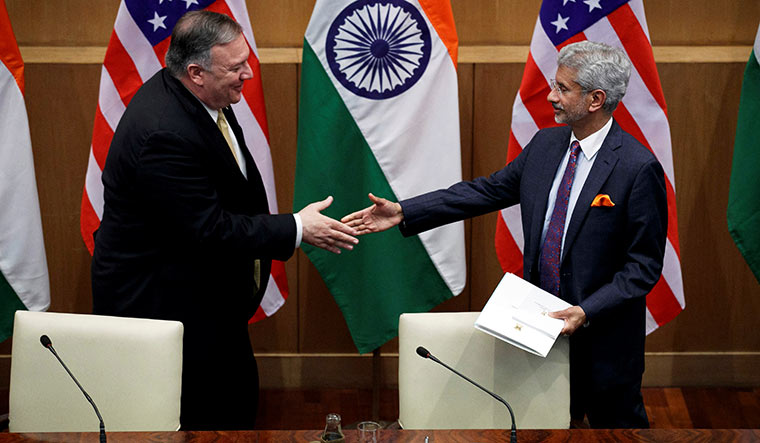IN DIPLOMACY, it is the little things that matter. The signal was in the flowers. When US Secretary of State Michael Pompeo arrived in India on June 25, he was received with a big bunch of white lilies by the joint secretary handling Americas in the ministry of external affairs. The message was clear: trade might be a big hurdle, but it was time to give diplomacy a chance.
“Both countries have their interests. And, it is natural to have some conflicts because of that. We will find a common ground using diplomacy,’’ said Minister of External Affairs S. Jaishankar. Pompeo understood the message. The secretary of state, who had publicly endorsed Prime Minister Narendra Modi’s ability to do anything, at the Ideas Summit organised by the US-India Business Council, seems to be on board with the truce, at least for now. “I have never found a partner, no matter how close, where we didn’t have places where we have to work through things,’’ said Pompeo, on the differences with India.
This is the first high level diplomatic exchange between the two countries after the Lok Sabha elections in May. Pompeo’s visit, immediately after the new government assumed office, is a significant American nod, making it clear that India does matter. India and America may have their differences, but they also have areas of convergence, away from the tariff war.
Pompeo’s visit was aimed at focusing on possibilities, rather than problems. “It is a welcome, timely and politically useful high level engagement, which will set the stage for the meeting between President Trump and Prime Minister Modi,’’ said Navtej Sarna, who was ambassador to the US. “It will also bring the focus back on to the real meat of the matter, which is strategy, security and counterterrorism. It will create a level of engagement, in which the trade differences can be boxed in.’’
The two leaders discussed prickly issues, but it was done in a “spirit of friendship’’, as Pompeo put it. “We pushed for a constructive and pragmatic view on issues related to trade,’’ said Jaishankar. On India’s plan to buy the S-400 defence systems from Russia, Jaishankar said a decision would be made keeping in mind India’s national interest. Pompeo, however, wanted India to buy more defence products from the US. On terrorism, Jaishankar thanked America for its “strong support’’, while Pompeo named Iran as “world’s largest state sponsor of terror’’ and linked India, being a victim of terrorism. Jaishankar said they held “common ground’’ on energy issues.
The real test for the relationship lies, however, in finding common ground on contentious issues. Jaishankar said the two countries agreed to filter out the noise and work on their solid relationship. But it may not be easy, especially with Trump moving into election mode. “Trade has always been a problem,’’ said strategic affairs expert Harsh Pant. “If you look at it in its totality, India has done a lot of give and take. But the framing is in such a way that trade becomes the centre. But then America has a problem on trade even with its closest allies.”
So, it all depends on whether the big picture focus will stay when Trump meets “beautiful’’ man Modi during the G20 summit in Japan. Over the years, Jaishankar has been able to work through the American system, using diplomacy to find solutions to very difficult problems. As India and the US try to take their partnership to the next level, his famed skills will face sterner tests.


